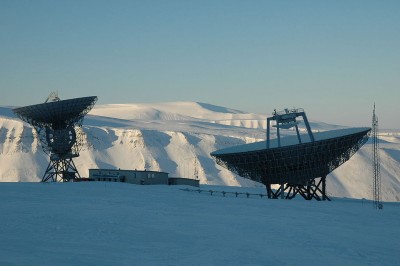Norwegian politicians are keen to restore diplomatic relations with China, but won’t grant China’s request to build a large radar antenna on Norway’s Arctic archipelago of Svalbard. While Norwegian officials won’t specify why they turned down China’s bid, it’s been reported that such highly sophisticated equipment has been used for spying in the past.

China has long been keen to expand its presence in the Arctic, where Norway plays a major role and controls wide expanses of Arctic territory, not least Svalbard. A few years ago, China was granted membership in EISCAT, a scientific organization owned by research councils and institutes in its other member countries of Finland, Japan, Norway, Great Britain, Sweden and Germany.
Antennae at EISCAT’s radar installations on Svalbard and in Tromsø are used to research the ionosphere and the Northern Lights, among other things.The Svalbard installation outside Longyearbyen has two large antennae and China wanted to build a third with a diameter of 50 meters, claiming it could be used to study the polar atmosphere and solar wind among other things.
‘Other uses’ worried Norway
“The goal of the installation is to conduct research on the upper reaches of the atmosphere, but the technology also has other uses,” Anne Kristin Hjukse of Norway’s education ministry told Norwegian Broadcasting (NRK). “After an overall evaluation, we don’t want such an antenna on Svalbard.”
Hjukse wouldn’t elaborate on what was behind the “overall evaluation” or on the other possible uses of what Chinese authorities were keen to build at their own expense. “We have handled (China’s request) in a comprehensive manner and evaluated all arguments for and against such an antenna,” she told NRK.
Asked whether the Foreign Ministry was involved in the evaluation, she would only repeat that “the case was thoroughly evaluated and this is our decision.” She said the ministry had received no reaction from China after being informed of the decision. China already is active in other forms of research on Svalbard, with a research station at Ny-Ålesund where Chinese scientists are studying marine biology, glaciers, the Northern Lights and the upper reaches of the atmosphere.
Earlier alleged spying target
Two years ago, a German TV documentary about Stasi operations during the Cold War reported that the EISCAT radar installation in Tromsø had been used for spying. A Finnish researcher employed by the EISCAT project allegedly delivered sensitive material collected by the antennae to the Stasi, with some reports containing military information.
Tor Bjørn Arlow, an expert on Svalbard’s history at the Norwegian University of Science and Technology (NTNU) in Trondheim, told NRK that he thinks both professional and political reasons are behind Norway’s rejection of China’s request. Even though Norwegian authorities are keen to melt the diplomatic freeze that began when Chinese dissident Liu Xiaobo won the Nobel Peace Prize in 2010, Arlow said the “difficult political climate” between Norway and China has contributed to making Norwegian authorities reluctant to approve such a radar antennae in such sensitive Arctic territory.
China recently banned imports of whole salmon from Norway and also abruptly cancelled a major business conference involving Norway’s largest employers’ organization, NHO. It’s unclear whether there was any connection to the rejection of their Svalbard radar project.
newsinenglish.no/Nina Berglund

